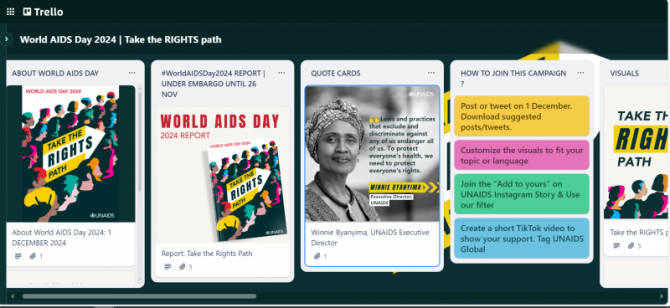Take the rights path - World AIDS Day 2024
The world can end AIDS – if everyone’s rights are protected.
With human rights at the centre, with communities in the lead, the world can end AIDS as a public health threat by 2030.
The substantial progress that has been made in the HIV response is directly linked to progress in protecting human rights. In turn, the progress made through the HIV response has galvanized broader progress in realizing the right to health and strengthening health systems.
But gaps in the realization of human rights for all are keeping the world from getting on the path that ends AIDS and are hurting public health, and now a surge in attacks on rights is threatening to undermine the progress that has been made.
Ending AIDS requires that we reach and engage everyone who is living with, at risk for or affected by HIV – especially including people who have been most excluded and marginalized. Gender equality is an essential element of an approach to AIDS that is grounded in human rights. Acceptance, respect and care are vital. Laws, policies and practices that punish, discriminate against or stigmatize people – because they are women or girls, or from key populations, or from other marginalized communities – obstruct access to HIV prevention, testing, treatment and care. So do laws, policies and practices that hinder the work of people who are providing vital HIV services for affected communities or who are advocating for reforms.
The path that ends AIDS is a rights path. Upholding the United Nations Declaration on Human Rights, and fostering inclusion of all communities, are essential for ending AIDS, for ensuring sustainable development and for human security. There is an urgent need to remove criminal and other laws which harm people’s rights, and an urgent need to enact laws and approaches which uphold the rights of every person. The mandates in the international human rights framework have the force of law, and communities have the right to hold duty-bearers accountable for adherence to the human rights commitments they have made.
To highlight the narrative continuation in UNAIDS messaging, the campaign continues the imagery of a path that leaders need to choose. Here that path is signposted as the rights path.
Because change depends not on a moment but on a movement, the message “Take the rights path” will not only ring out on one day. It will be at the core of activities that will build up across November, see the release of the World AIDS Day Report – entitled Take the rights path – on 26th November, reach a crescendo on World AIDS Day on 1 December, and continue to echo throughout December and beyond.
The upholding of everyone’s human rights is an essential underpinning of an effective HIV response. This World AIDS Day is a call to action to protect everyone’s health by protecting everyone’s rights. Leaders need to take the rights path.
UNAIDS report shows that upholding human rights is vital for ending the AIDS pandemic
GENEVA, 26 November 2024— Ahead of World AIDS Day (1 December), a new report by UNAIDS shows that the world can meet the agreed goal of ending AIDS as a public health threat by 2030 – but only if leaders protect the human rights of everyone living with and at risk of HIV. The report’s message is summed up in its title: “Take the rights path to end AIDS”.

Embark on a journey through ideas, voices and stories that illustrate the rights path.
Adaptable materials for World AIDS Day are now available from this Trello board, featuring quote cards, how to join the campaign, visuals, GIFs, photos, tagline, social media banners, zoom backgrounds, stories from around the world, partners' campaigns, and more being added. Materials can be tailorable by countries and communities.



